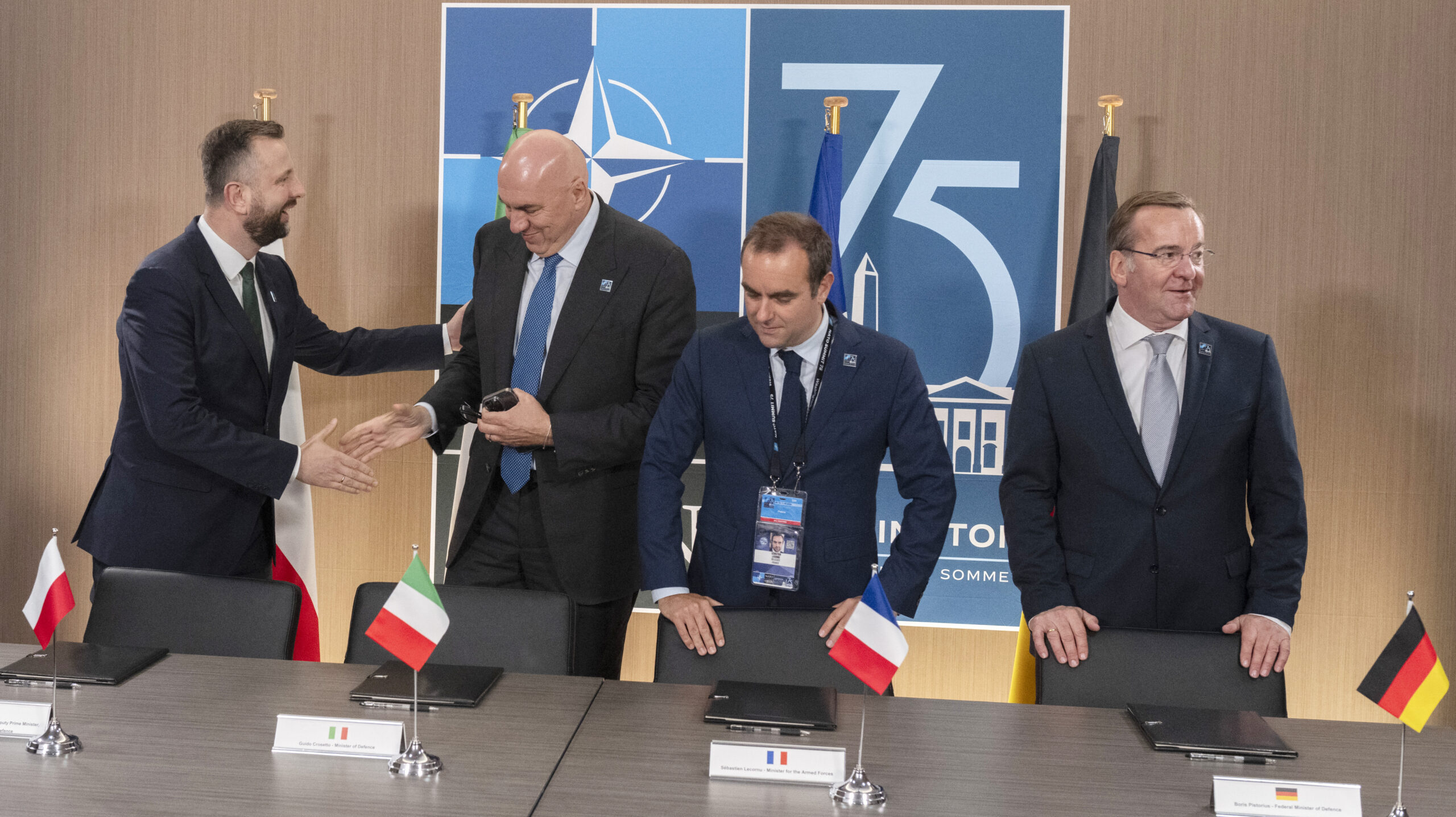Air Warfare, Global

(L-R) Defense ministers of Poland, Wladyslaw Kosiniak-Kamysz; of Italy, Guido Crosetto; of France, Sebastian Lecornu; of Germany Boris Pistorius, prepare to sign a Letter of Intent on a “European Long-Range Strike Approach,” or ELSA on July 11, 2024. (ROBERTO SCHMIDT/AFP via Getty Images)
NATO SUMMIT 2024 — Defense leaders of four European powers announced this week they plan to work together to build new long-range strike weapons to shore up gaps in European defenses highlighted by the fighting in Ukraine.
The defense ministers of France, Germany, Italy and Poland signed a letter of intent Thursday for what they’re calling the European Long-Range Strike Approach (ELSA). According to the French embassy in the US, the initiative “will allow the nations to develop, produce and supply capabilities in the field of long-range strikes, paving the way for cooperation aimed at strengthening our military capabilities and the European defense and industrial base.”
The effort includes the development of “missiles with a range beyond 500 kilometers” meant to “fill a gap in European arsenals that [participating nations] say has been exposed by Russia’s war in Ukraine.”
See more
La guerre en Ukraine montre que les frappes longue portée sont un enjeu clé pour la défense de l’Europe.
Au sommet de l’OTAN à Washington, signature d’une lettre d’intention 🇫🇷🇩🇪🇮🇹🇵🇱 pour initier une coopération dans ce domaine mobilisant notre industrie de défense européenne. pic.twitter.com/NfZMM1QSIP
— Sébastien Lecornu (@SebLecornu) July 11, 2024
Specifically, Reuters reported, citing a military source, that the project envisions a cruise missile with a range of between 1,000 and 2,000 kilometers.
Few additional details about the project have been made available. European missile maker MBDA announced last month it was developing a new land-based cruise missile, creatively dubbed Land Cruise Missile, based on an existing naval variant.
That new munition “will offer the same unique capabilities as the [naval varient], including: metric precision at very long range; high survivability when penetrating through enemy integrated air defence systems thanks to reduced radar cross section & terrain-following capability; and high lethality against targets,” according to MBDA’s announcement.
French Defense Minister Sebastian Lecornu said Thursday the new French-German-Polish-Italian project would be open to other partners. The French government said the project could “draw on European funding.”
“The idea is to open it up as widely as possible,” Lecornu told reporters, according to Reuters, and indicated Britain’s new Labour government could come along. “It has value, including on a budgetary level, because it obviously also allows the various costs to be amortized.”
The Europe-developed missile would address two linked concerns for European military planners: the need for more long-range strike capability, and the need to greatly expand the ability of the continent’s industrial base to produce weapons at scale and speed.
“In all honesty right now we have in Europe a defense industrial base that’s shaped for a peacetime situation, and then we look at the war in Ukraine — it’s a war of attrition, a war of warehouses,” Swedish Defense Minister Pal Johnson said at a separate NATO event Wednesday. “So I think there’s lots of things we need to do in order to ramp up industrial production.”
The new long-range missile development program comes as Berlin also announced it would allow the US to deploy its own longer-range missiles on German territory, drawing condemnation from Moscow.
Speaking to reporters on Thursday, German Chancellor Olaf Scholz pushed back on Russian criticism of that move, saying that long-range weapons were “necessary for deterrence and peace.”
Source link : https://breakingdefense.com/2024/07/let-it-go-long-france-joins-germany-italy-and-poland-in-new-elsa-long-range-missile-project/?amp=1
Author :
Publish date : 2024-07-12 18:11:26
Copyright for syndicated content belongs to the linked Source.


